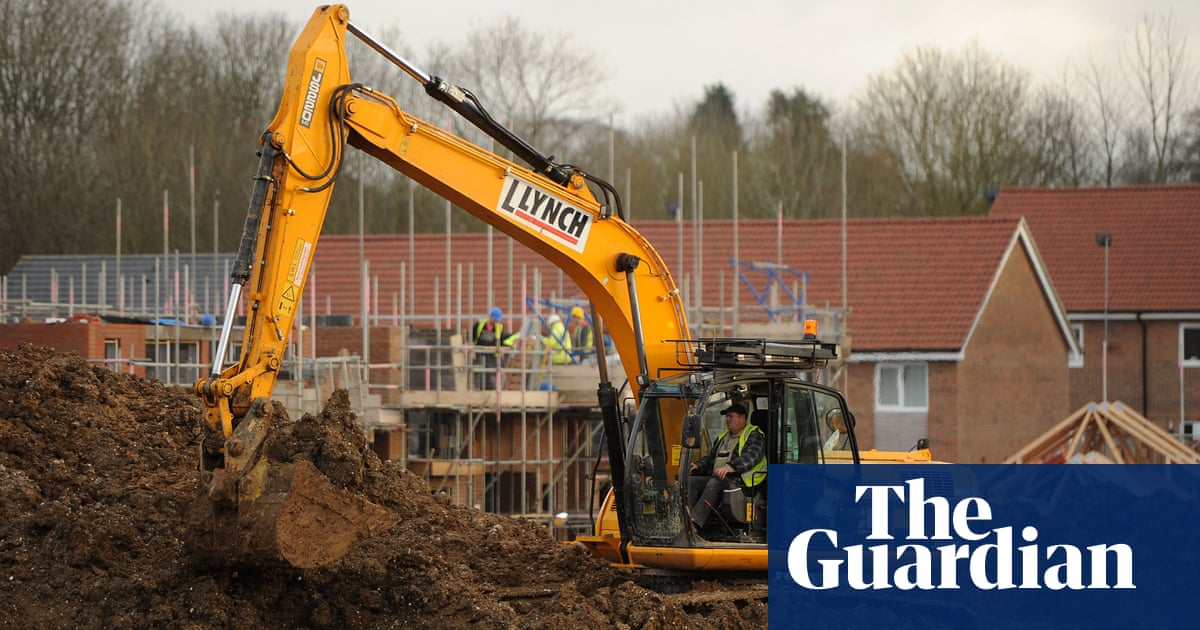Labour will miss its manifesto target of building 1.5m homes in England before the end of this parliament without more radical reform to the planning system, the thinktank the Centre for Cities has warned.
Keir Starmer put tackling housing affordability at the heart of his pitch to voters, promising to “get Britain building again”.
However, the thinktank says the actions the government has taken so far – including re-establishing local housing targets and boosting funding for social housing – do not go far enough.
In a report, the Centre for Cities analyses housebuilding data stretching back to 1947, when the Town and Country Planning Act was introduced, laying the groundwork for the system in place today.
It argues that even if private sector building matched its strongest performance in that 80-year period, the government is still set to fall 388,000 homes short of its target.
Andrew Carter, the chief executive of the Centre for Cities, called on the government to be “much more ambitious”, in pursuing its goal.
“We’re in a productivity crisis. The UK’s big cities are the jobs and productivity engines of the economy but our planning system doesn’t allow – and has never allowed – them to build an adequate supply of homes for everyone that could work there,” he said.
Buying a home has moved increasingly out of reach for younger workers in recent decades. Official figures show the average house was worth 3.55 times average earnings in 1997, but that had rocketed to more than eight times by 2023.
To tackle the issue, the Centre for Cities advocates a more drastic approach to planning reform than Labour has so far contemplated – including a form of “zoning”.
This system, common in European economies, allows authorities to decide which areas are ripe for building. There is then a presumption that planning permission will be granted, as long as applications meet a series of rules about the quality of developments.
That contrasts with the existing approach, where individual planning applications are contested locally, in a process that can be time-consuming and inconsistent.
“By removing the discretionary element of the planning system, the UK would bring its planning system in line with most developed economies, remove a big block on housebuilding and enable places to better respond to future rises in demand for homes,” Carter said.
The report, written by the housing expert Anthony Breach, argues that planning restrictions, including the introduction of the green belts from 1955, have prevented sufficient homes from being built where they are needed.
It suggests London is particularly at risk of falling short of the number of homes required, and calls on the government to overhaul the plans for housing in the capital.
Other recommendations from the Centre for Cities include releasing some green belt land for development, including around railway stations, as well as a bigger role for the public sector in housebuilding.
after newsletter promotion
Labour has suggested creating a new category of “grey belt” land, for areas that are currently designated as green belt but not of high environmental quality.
The government has been consulting on changes to the national planning framework to bring some of these proposals into effect. It also intends to devolve more strategic planning powers to metro mayors.
However, government insiders are clear that zoning is not under consideration – regarding it as too disruptive to implement.
The former housing minister Robert Jenrick tried to introduce a zoning system during Boris Johnson’s premiership but the proposals were ditched after a backlash from Tory MPs and local councillors.
The housing minister, Matthew Pennycook, recently reaffirmed the government’s 1.5m homes target, calling it “essential” – but conceded that it would be “more difficult” to fulfil than Labour expected.
The Centre for Cities analysis follows warnings from several local councils, including some controlled by Labour, that the local targets the government plans to impose are unachievable.
In consultation responses obtained by the BBC, Labour-run Broxtowe council in Nottinghamshire said the targets were “very challenging, if not impossible to achieve”, while Labour-run South Tyneside called them “wholly unrealistic”.
A spokesperson for the Ministry of Housing, Communities and Local Government said: “Despite the dire housebuilding inheritance we are trying to fix, we will deliver the 1.5m homes our country desperately needs and get Britain building again.
“To get there, the government has already outlined plans to streamline the planning system, restored mandatory housing targets, established a programme to unblock homes stuck in the planning process and set up a new body to deliver the next generation of new towns.
“On top of this, our planning and infrastructure bill will go even further in overhauling the planning system to boost housebuilding and economic growth across the country.”

